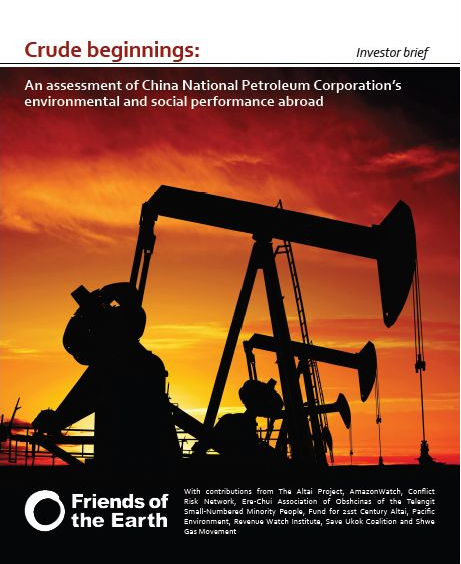
Crude beginnings: the environmental footprint of China National Petroleum Corporation around the world
The growing power of Chinese multinational corporations around the world, particularly in developing countries, is drawing a lot of attention.
International companies complain that they are losing out to Chinese businesses benefiting from state support – government backing with few environmental and social requirements. Environmentalists and human rights activists are concerned that Chinese banks and companies may be spurring a race to the bottom by not adhering to international policies and norms such as World Bank environment and social standards. International investors, who own tiny shares of some Chinese state-owned enterprises, are coming under pressure for the environmental and social impacts of those holdings.
But are Chinese state-owned oil companies really worse than international oil companies? We released a new report today to help answer this question. The report, Crude beginnings, is one of the first of its kind, and looks at the environmental and social aspects of China National Petroleum Corporation’s overseas investments. CNPC is one of China’s leading oil companies, is the parent company of publicly listed PetroChina and Kunlun Energy, and has operations in over 29 countries.
Following in our tradition of working with shareholders (we hosted a workshop on shareholder engagement with Chinese listed firms in 2007, participated in a similar investor panel in 2010, and hosted a shareholder webinar 2010), this report was conceived and written as an investor brief. We are presenting it today at an investor webinar hosted by the International Working Group of the Forum for Sustainable and Responsible Investment (US SIF), and are doing a second briefing for Principles for Responsible Investment shareholders in March.
Crude beginnings describes CNPC’s internal social and environmental governance systems and analyzes the influence that the Chinese government and other stakeholders (including investors) wield over the firm. It also reviews the company’s overseas performance across a range of environmental, social and governance metrics, and includes case studies.
Some of our results were unsurprising. For example, we found that CNPC, like many of its international peers, faces a challenging set of environmental and social risks. Its overseas projects are often located in environmentally sensitive areas, including the Canadian boreal forest (where the company is drilling for tar sands); it has investments in seven of the 10 most corrupt countries in the world, according to Transparency International; and many countries in which CNPC invests have been affected by varying degrees of violent conflict. However, unlike many of its competitors, CNPC has not developed company-level governance systems, including policies and designated personnel, to specifically manage the environmental and social impacts of its overseas subsidiaries. As a result, some of its projects, like the ones in Sudan, Kazakhstan, Myanmar (Burma) and Russia, face real business risks.
But we also found some pleasantly surprising results. In Peru, for example, it appears that CNPC’s subsidiary SAPET renegotiated the boundaries of one of its oil concessions so that it would not drill in an uncontacted peoples reserve; this would have threatened these peoples with disease, violence and cultural extinction. NGOs had been trying for years to get the government and previous concessionaires to commit to avoiding this reserve, but to no avail. And as we describe in the study, the local Extractive Industry Transparency Initiative in Iraq reports that the company has been an “outstanding” participant in efforts to promote revenue transparency among the country’s oil sector.
So is CNPC worse, environmentally and socially speaking, than its international peers? Probably not when it comes to environmental and community impacts on the ground – the issues Friends of the Earth cares most about. But when it comes to strategy, systems, policies and personnel, CNPC is comparatively ill-equipped to handle these risks. And looking forward, all oil majors are going to face higher political, technical, operational, social and environmental challenges as they try to develop ever-more remote and difficult-to-access oil assets. If CNPC doesn’t get a handle on these issues soon, it will face more trouble and challenges than it does now.
Leadership on managing political, social and environmental risks abroad is likely to come from CNPC’s subsidiaries on the front lines. If the company can build from these experiences, and draw from international best practices and norms, then the company will do better by communities, the environment and its shareholders – both public and private.
Related Posts
Ways to Support Our Work

Read Latest News
Stay informed and inspired. Read our latest press releases to see how we’re making a difference for the planet.

See Our Impact
See the real wins your support made possible. Read about the campaign wins we’ve fought for and won together.

Donate Today
Help power change. It takes support from environmental champions like you to build a more healthy and just world.